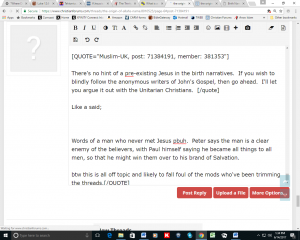So just like the Qur'an, the statement Ehyeh Asher Ehyeh; I will be that I will be is not found in the NT.
'I am' is another statement, not a name and in the original manuscripts the whole chapter was either written in uppercase or 'I AM' was just written 'I am'. Jesus pbuh was explaining God had told Abraham pbuh about him, the Jews were confused and thought he was blaspheming, as Jesus pbuh went on to explain before Abraham pbuh was I am..... They picked up stones preventing him from explaining. What would his sentence have looked like before they interrupted? who knows...
'before Abraham pbuh was I am told him'
'before Abraham pbuh was I am had planned to'
etc etc
Like the Jews, you appear to be jumping to wild conclusions.
This is what you think and believe, and that's fine. I disagree as Jesus pbuh clearly denies he asked anyone to take him or his Mother as gods besides Allah swt. Jesus pbuh was performing miracles and healing the poor, he was preaching against the corrupt rulers and the Pharisees saw him as a threat. They looked for any excuse to rid themselves of him. The words I am are found in several places in the NT. Paul uses the term too.
Abraham pbuh knowing about him just confirms he was the expected Messiah. Nothing about being God here just confirmation Allah swt sent him.
"I am he"—Mark 13:6; Luke 21:8; John 13:19; 18:5, 6 and 8. "It is I"—Matt. 14:27; Mark 6:50; John 6:20. "I am the one I claim to be"—John 8:24 and 28.).
It is obvious that these translations are quite correct, and it is interesting that the phrase is translated as "I am" only in John 8:58. If the phrase in John 8:58 were translated "I am he" or "I am the one," like all the others, it would be easier to see that Christ was speaking of himself as the Messiah of God that Abraham pbuh knew of.
No, only that Abraham pbuh knew of him.
they picked up stones when he was mid sentence. It clearly explains, 'hid himself and went out of the temple.' God Almighty doesn't fear sticks and stones.
I'm sure he explains himself elsewhere and indeed he does:
John 10:33 “We are not stoning You for any good work,” said the Jews, “but for blasphemy, because You, who are a man, declare Yourself to be God.” 34 Jesus replied, “Is it not written in your Law: ‘I have said you are gods’?
There you have it, clearly categorically denying he is divine.
Yes by the Jews themselves, not crucifixion at the hands of Pagans.
Jesus is a Jew and His followers were Jews and the leaders of Judaism were Jews. They knew God is the Great I AM.
Upvote
0


